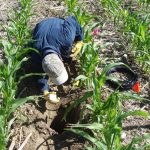Water use is something that both researchers and farmers have explored for decades: what happens to a crop when irrigation is reduced? All backyard gardeners or self-proclaimed green thumb know that plants need water. But how much water is enough? What amount still guarantees healthy plant growth and a good yield of wheat, corn, alfalfa, sorghum, or sunflower? Agricultural engineers are experimenting with new ways to grow more with less water in a process called deficit irrigation: it’s a practice where farmers reduce the amount of water applied to a crop, allowing mild stress to the growing plants.
According to the FAO, irrigated agriculture uses more than 70 percent of the water withdrawn from the earth’s rivers; in developing countries around the world, that figure can exceed 80 percent. In Kansas, irrigation accounts for 85 percent of all consumptive water use – mainly from the Ogallala aquifer. With unsure rainfalls and aquifers diminishing faster than they can recharge, the trick is knowing exactly how much stress a crop can take, and precisely adjusting irrigation to still result in a profitable harvest. Dr. Isaya Kisekka, an assistant professor in K-State’s Department of Biological and Agricultural Engineering, is working to take the guesswork out of the equation and give farmers the tools they need to maintain their net profitability and protect the state’s water resources for future Kansas farmers.
